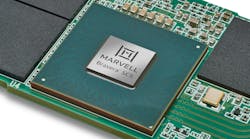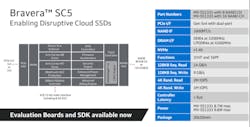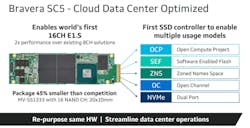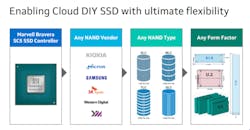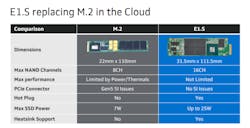Marvell Introduces First Family of PCIe Gen 5 Flash Memory Controllers
Marvell Technology rolled out its first family of SSD controllers to support PCIe Gen 5, promising to bring better performance, power efficiency, flexibility, and security to flash storage solutions in the data center.
The company, headquartered in Santa Clara, California, said the Bravera SC5 family of flash controllers are designed for bandwidth- and performance-hungry servers in the cloud and corporate on-premises data centers. The enormous amount of data is processed in these sprawling warehouses of servers is driving demand for not only higher capacity but also faster, smaller, and more secure server SSDs, Marvell said.
The chips—part of Marvell's new Bravera family of SSD and HDD storage processors—can supply up to 14 Gbps of throughput and up to 2 million random input/output operations per second, or IOPS, giving it about double the performance of current PCIe Gen 4 SSDs. Marvell said its latest line of chips, including MV-SS1331 and MV-SS1333, can support up to 8 or 16 channels of NAND flash and support NVMe 1.4.
A flash controller is a category of special-purpose processors inside SSDs (and HDDs) that are used to communicate with storage when the central processing unit (CPU) in the server needs to read, write, or erase data to it. Every time a computation is performed, data travels from the CPU to the SSD and then returns to the CPU, which creates delays or latency that can drag on performance at the system level.
More advanced flash controllers such as Marvell’s Bravera SC5 product line are needed to keep up with demand for higher storage capacities and faster speeds with every new generation of data center SSDs.
Marvell said the chips are ideal for both compute workloads where high throughput and reduced latency are required and storage workloads that take advantage of more storage capacity and security. Marvell said it also upgraded the underlying architecture of the chips, giving them 40% better power efficiency than its previous generation. The flash controllers are packed within power envelopes of less than 10W.
The MV-SS1331 and MV-SS1333 also promises to provide a performance uplift for machine learning and other server workloads. Marvell said the chips cut latency up to 30% compared to its previous generation.
Marvell said the Bravera family of SSD controllers are based on a system-on-a-chip (SoC) architecture loaded with general-purpose compute and special-purpose accelerators. The chips add 10 Arm-based CPU cores, including Arm's real-time Cortex-R8 and embedded Cortex-M7 cores, plus a Cortex-M3 with SRAM for storing instructions and data. These are supplemented with its hardware-based SLA enforcer to take over behind-the-scenes chores from the CPU, plus DMA controllers and firmware accelerators.
Marvell said the NAND flash controller at the heart of the product line features the latest generation of its "NANDEdge" LDPC engine. The chips can support up to 4 PCIe Gen 5 lanes or a dual-port configuration of 2 PCIe lanes per port. The chips, packed in a 20-mm by 20-mm package, also integrate a DRAM memory interface that can be configured for DDR4 running at 3.2 GHz or LPDDR4X at 4.2 GHz, the company said.
On the security front, Marvell's flash controllers also integrate root-of-trust (RoT) features and a range of cryptography engines, including AES-256, SHA, and RSA, isolated in a secure boundary in the silicon. The chips incorporate end-to-end data path protection to impede hackers trying to access, alter, or erase data stored in cloud servers or corporate data centers. The chips also feature advanced hardware debugging.
Flexibility was also one of the focal points in the development of the chips. Marvell said customers can use the same stack of underlying hardware and firmware to develop different SKUs for the data center.
Marvell said it worked with Microsoft, the world's second-largest cloud computing firm behind Amazon, to incorporate the Open Compute Project's Cloud SSD standard in its SC5 family of flash controllers. The OCP standard, which was largely developed by Microsoft and Facebook, expands on the NVMe standard and sets out all the features of cloud storage drives, plus the performance and power levels required by different form factors. The new standard is also backed by leading server manufacturers HPE and Dell.
The chips also give customers the ability to develop a single SSD that can be used to support different technologies, including NVM Express (NVMe), Software-Enabled Flash (SFE), and Open Channel (OC), among others.
Marvell said its new chips can support SLC, MLC, TLC, QLC, or any category of 3D NAND flash from any vendor, including Micron Technology, Samsung Electronics, SK Hynix, Western Digital, or China's YMTC. The company said the Bravera SC5 controllers are also ideal for any of the industry-standard SSD form factors that are slotted in cloud servers, ranging from the M.2 to new ruler-shaped E1.S and E1.L cards.
Microsoft and other technology titans see advantages in the E1.S as a building block for flash storage in data centers. The E1.S card is slightly longer than the M.2 and is arranged vertically in servers, like books on a shelf, giving it the ability to accommodate more flash memory in a compact footprint. Marvell said its flash-controller family supports up to 16 NAND chips in the E1.S form factor, up from eight in the M.2.
Thad Omura, vice president of marketing of the flash-storage business at Marvell, said that the “Bravera SC5 SSD controllers are first to market with innovative data center features that extend Marvell’s flash storage technology leadership." He added that "we’re working with the entire ecosystem to enable SSD vendors and do-it-yourself cloud service providers to deploy the most advanced flash storage solutions."
Marvell, which also sells networking-switch chips for data centers and baseband processors for 5G, said that it has started sampling the chips to select customers, which can reply on Marvell's firmware stack or in-house firmware. Industry analysts said that server processors supporting the PCIe Gen 5 interconnect standard are on pace to be deployed in data centers starting in the second half of 2021 and in early 2022.
Marvell said that semiconductor makers Intel and AMD, memory chip vendors SK Hynix and YMTC, and cloud giants Microsoft and Facebook have come out in support of its new Bravera SC5 SSD controllers.
“Marvell’s launch of its new Bravera SC5 SSD controller family marks a milestone for the industry in enabling next-generation cloud infrastructure,” said Grace Gong, senior vice president of marketing and sales at YMTC. She said that the memory chip industry has been working on "next-generation NAND to help advance data center efficiency and bring flexibility to address emerging cloud storage requirements.”
